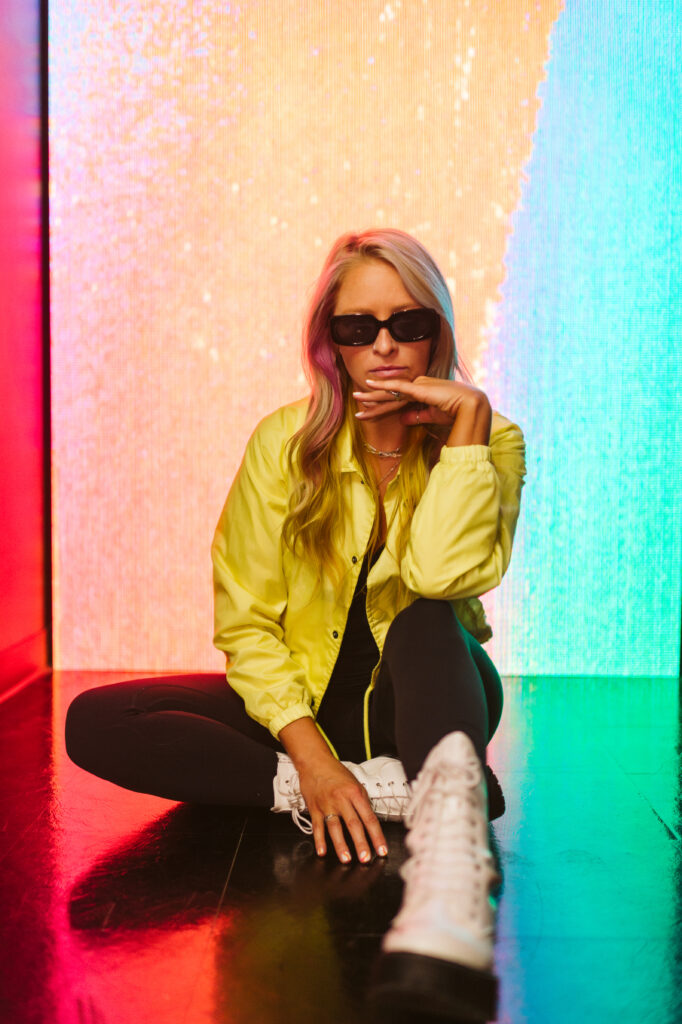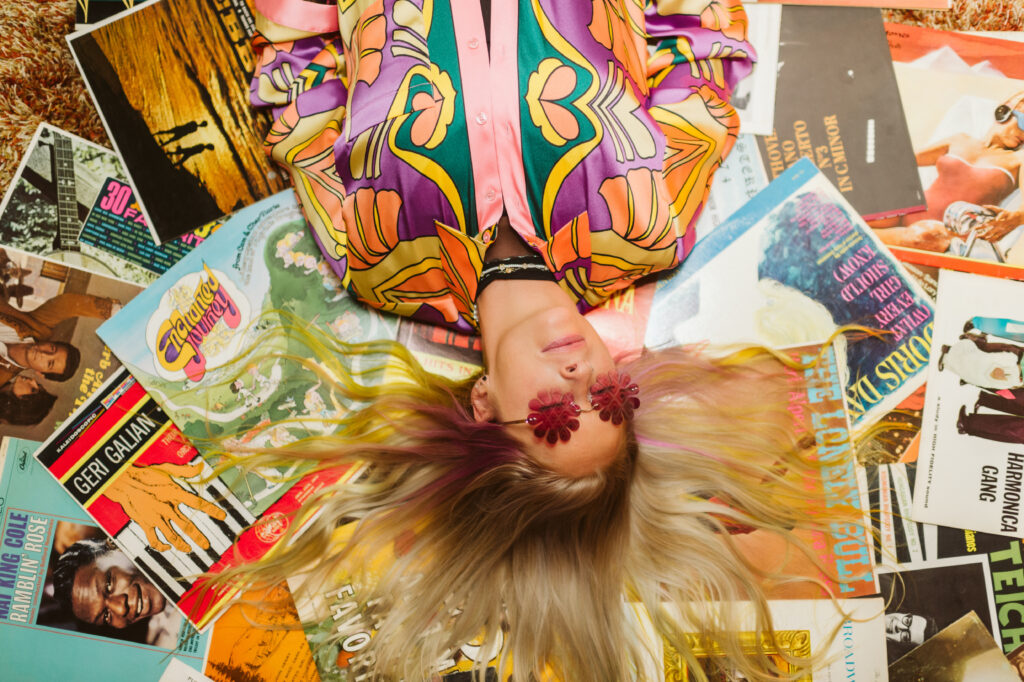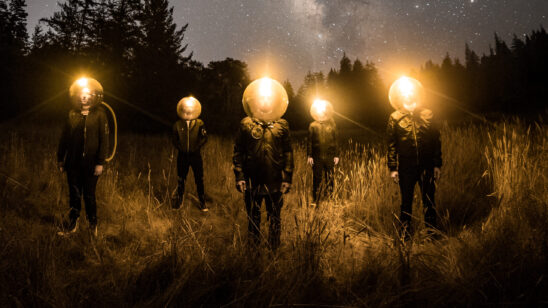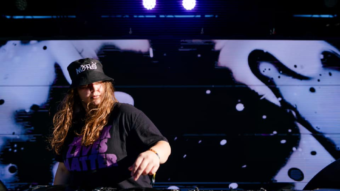
Maddy O’Neal Reflects on Transformational Sophomore Album, Ricochet
Music is a powerful form of expression and self-exploration. In times of struggle, music is a luminous lighthouse that guides us through the turbulent waters — a beacon guiding us back to solid ground. There was a time when Maddy O’Neal, a future bass and dance producer with deep roots in Colorado’s electronic jam scene, felt the waves crashing in. When a global pandemic abruptly halted five years of constant touring, O’Neal felt conflicted.
On one hand, she finally had a moment to herself, a quiet escape from a hectic life on the road. On the other hand, her entire career was in question, challenged by a stagnant society trapped in a world without live music, deprived of normal social interactions.
Overcome with a lack of direction, she faced the fork in the road the only way she knew how: she followed the music, and let her creativity guide her back to earth. Thus, Ricochet, O’Neal’s sophmore album — the soundtrack on her journey of spiritual realignment and rediscovery — was born.
“I felt this profound sense of bouncing back and returning to feeling like myself, trusting my vision and knowing exactly what I wanted to say,” O’Neal said about Ricochet’s creative process. “That was the coolest feeling in the world.”
Ricochet represents a decade’s worth of O’Neal’s experience and musical exploration, expressed through a cohesive 10-track project filled with a wide range of sonic influences and emotional awareness. Ricochet’s definitive purpose is to capture O’Neal’s intimate relationship with music, forged in the Front Range of Colorado and years spent in a tour bus.
Although Ricochet’s initial tracks were created in 2020, the fundamental groundwork was laid in Boulder, CO in 2010 during O’Neal’s sophomore year attending CU Boulder, an era considered by many, including O’Neal, to be a “golden age” of EDM. Boulder served as the epicenter of that evolution.

“Coming to Colorado, especially during that time, it was like my brain was cracked wide open,” O’Neal said about experiencing her first taste of Colorado’s expanding electronic music scene. “Of course, there was house music, but there were also people like GRiZ and Pretty Lights and Big Gigantic. Hearing the way those people merged genres was unlike anything I’d ever experienced before. I immersed myself in everything that was going on in Boulder, which I would definitely consider to be a golden era of electronic music.”
Within two years of moving to Boulder, O’Neal had all the resources she needed to produce music and dive head-first into the scene. Between a handful of musical mentors she met through the snowboarding community (which O’Neal insists went hand-and-hand), and access to the Ableton production software, which her brother recycled to O’Neal after she gifted the program to him in 2010, her creative future quickly took form.
Since then, O’Neal has become a staple in the Colorado EDM and jam scenes. From her first tour with Michael Menert in 2013 (fun fact — ODESZA was support for Michael Menert on that tour) and hitting the road with SunSquabi to making tracks with Bass Physics, Marvel Years. and Homemade Spaceship, her Colorado roots have remained firm throughout her decade-long career.
“Some of the first people I met ever in Colorado were the SunSquabi boys, Late Night Radio, and Michael Menert,” recalled O’Neal. “We all became a squad together. We were playing shows for like five people, just getting started. It’s really awesome to have all of those people in my life still and to have grown together. We’re all doing well and they’re still my best friends. Having people that have been with you from the start to finish is really important to me, so that’s the coolest thing ever.”
Most recently, these influences have manifested on her sophomore LP, Ricochet, which features tons of Colorado artists including MOONZz and Ryan Jalbert (The Motet). More importantly, though, Ricochet represents the collaborative spirit and unconstrained sound of Colorado’s music industry. From “Affected,” a funky jamtronica posse cut featuring members of STS9, The Motet, and Lettuce, to “Change of Pace,” a woozy future-bass track full of self-awareness and careful introspection, Ricochet dabbles in a wide variety of sonic influences under the umbrella of “electronic” music.
In much the same way Ricochet bounces from one genre to the next, the content of the album focuses on O’Neal’s spiritual and emotional return to self after a period of identity crisis and burnout from years of relentless touring followed by the defining silence of a global pandemic.

“At the beginning of the pandemic, it was just madness,” she said. “I went through this period of thinking ‘am I ever going to have a career in music again? Will that even exist? What is the world gonna look like on the other side of this thing?’ A lot went on in my head and I asked myself ‘why am I doing this? What, what would I be doing if I wasn’t in music?’ I think everyone had that thought at some point in time. I realized I didn’t know who I was without music, and I had to be as much myself as possible.”
When the world came to an abrupt halt in 2020, five years of touring dissolved into silent isolation. Confident that her future was exclusively tied to music and overwhelmed with stagnant free time, she knew it was time to produce her second album. The first step was building what O’Neal calls her creative “crayon box” of sounds and techniques.
“When I was learning how to produce someone told me ‘keep your crayon box small.’” she said. “The fewer crayons that you have, the more things you can master with them. It’s better to master a few things instead of trying to pull from this infinite pool of resources that exist. That’s how you will get your sound.”
—Maddy O’Neal
These days, O’Neal’s creative crayon box is constructed by handmade, self-manufactured sounds and carefully orchestrated instrumental elements from her friends and musical peers. However, when O’Neal was learning to produce, her crayon box looked much different — formed from deep dives into crates of vinyl at local record stores, inspired by the hip-hop genre that sparked her passion for music in her youth.

“The way that I learned how to make music was by reverse engineering what nineties hip hop producers were doing,” O’Neal said. “I would go to record stores, get vinyl, put it in my computer, chop ’em up and dig for soul [samples]. A lot of those songs have this style and feel that I was drawn to. So that’s why I started making music that way too. I wanted to like bring a little bit of that with me.”
Ricochet makes that perfectly clear. O’Neal’s new album is a statement of confidence anchored in her musical roots. From the hip-hop aesthetics on “Get Gone,” Ricochet’s closing track with Lily Fangz, to the whimsical synth-bass on “Follow Me,” O’Neal explores 10 years of experimentation in electronic music production with a careful dedication to her sonic diversity.
Ricochet is about rediscovery; there’s a quiet acknowledgment of healing and newfound purpose intertwined throughout the 39-minute runtime. Although Ricochet is a love letter to O’Neal’s creative foundations, it’s also a fearless step forward into the next phase of her career, defined by a well-earned sense of proud accomplishment.

O’Neal’s confidence is warranted, and Ricochet is a great taste of the new heights O’Neal will certainly reach in this new phase of her career.
“I definitely learned more making this record than I have with any other project I’ve created… I think that it takes a long time to really find your sound. I’ve tried out a bunch of different things. I was way more electro-soul when I started, and more sample-heavy. I feel like I’ve thrown everything at the wall, and now I know what parts I want to stick. It feels hard to explain, but I just trust where I’m at in my creative process.”






